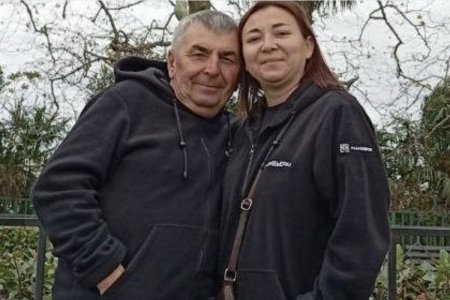
Sakha Manhubi last spoke to her mother on 2 November 2024 when she rang to say that she would soon pick up her children. She disappeared, with her mother later learning that she had been taken away by men in masks who provided no explanation but were clearly from Russia’s FSB. Over a year later, there has been no official acknowledgement of her detention, nor explanation of why she is being held.
Sakha is just 28, and was bringing up her son and daughter alone, following her divorce, with her parents looking after the children while she was at work. On the Saturday that she disappeared, she had phoned her mother to say that she would just tidy up in the apartment and then pick up the children.
She did not come, with her mother’s calls going unanswered. It is fortunate that she was renting accommodation next to where her landlady lived, as it was the latter who rang her mother at about 5 p.m. that day. She explained that five masked men had turned up and, from 2 to 5 carried out a search of Sakha’s home before taking the young woman away.
Sakha’s mother reported her apparent abduction to the occupation police. Having heard nothing from them in a week, she phoned to ask if her daughter had been reported as missing. It was only then that she was told to come in and given a piece of paper saying that her daughter had been taken away by Russia’s FSB.
Over the following six months, the family’s formal requests for information went unanswered by the FSB, yet when they then approached the occupation ‘police’ they were told that the latter “do not divulge information linked with the FSB”. From then on, they sent questions to the occupation prosecutor, the military prosecutor and even the ombudsperson, receiving only fob-off replies. There was, however, a response, finally, from the FSB, denying any knowledge of Sakha Manhubi. Such denials have become standard, however evidently untrue. Unofficially, the family have been told that the FSB received three anonymous denunciations against Sakha. The current Russian regime has certainly encouraged Soviet-style denunciations however this could also just as easily be an excuse for targeting the young woman.
The family have, at least, learned from a person who was briefly held in a cell with Sakha that she is imprisoned in SIZO No. 2, one of two remand prisons which the Russians opened after the full-scale invasion of Ukraine. SIZO No. 2 is believed to be under the control of the FSB, and to be used for political prisoners.
Such long periods during which the FSB hold a person incommunicado, without any official acknowledgement that they are in custody, are especially dangerous and are typically used to extract ‘confessions’ through torture, threats or psychological pressure and fabricate ‘evidence’. The lack of any formal detention means they can delay bringing official charges and prevent the person having access to an independent lawyer.
All of these ploys have been used repeatedly in occupied Crimea and, as Natalia Adamovych from the ZMINA Human Rights Centre stressed, increasingly against women. In very many such cases, the ‘arrests’ are much more reminiscent of enforced disappearances, with information often coming to light long after a person is first abducted.
Lera Dzhemilova was just 27 when first seized by the FSB on 21 May 2024. She was held totally incommunicado, without any acknowledgement of her detention, for ten months and it was almost a year before mystery ‘treason’ charges were brought. She was sentenced by an occupation ‘court’ on 20 August 2025 to 15 years’ imprisonment, with the ‘trial’, like everything else about her persecution, having been carried out in secret.
In Lera’s case, the situation is particularly serious as she suffers from epilepsy, and is experiencing severe epileptic fits in the appalling prison conditions.
As well as targeting women much more since the beginning of the full-scale invasion of Ukraine, Russia has also become increasingly likely to use ‘treason’, ‘sabotage’ or ‘terrorism’ charges, with these carrying huge, and essentially, guaranteed sentences.
See also:
Lera Dzhemilova
Nasiba Saidova, Fevziye Osmanova, Esma Nimetulayeva and Elviza Alieva
Ksenia Svietlishyna
13-year sentence on ‘treason’ charges for pro-Ukrainian graffiti in Russian-occupied Crimea
Nadiya Hrekova
Crimean woman sentenced to 22 years for an invented ‘terrorist attack on a Russian military officer
Victoria Strilets and her daughter Oleksandr Strilets
Khatidzhe Buyukhchan
Russian FSB concocts ' terrorism' charges two months after abducting 24-year-old Crimean Tatar woman
Natalia Poliukh and her husband Oleh Platonov
Oksana Senedzhuk Russia rubberstamps 15-year ‘treason’ sentence against 58-year-old Crimean activist Oksana Senedzhuk
Nina Tymoshenko Russia’s most savage sentence yet against 66-year-old Ukrainian woman from occupied Crimea
Liudmyla Kolesnikova



